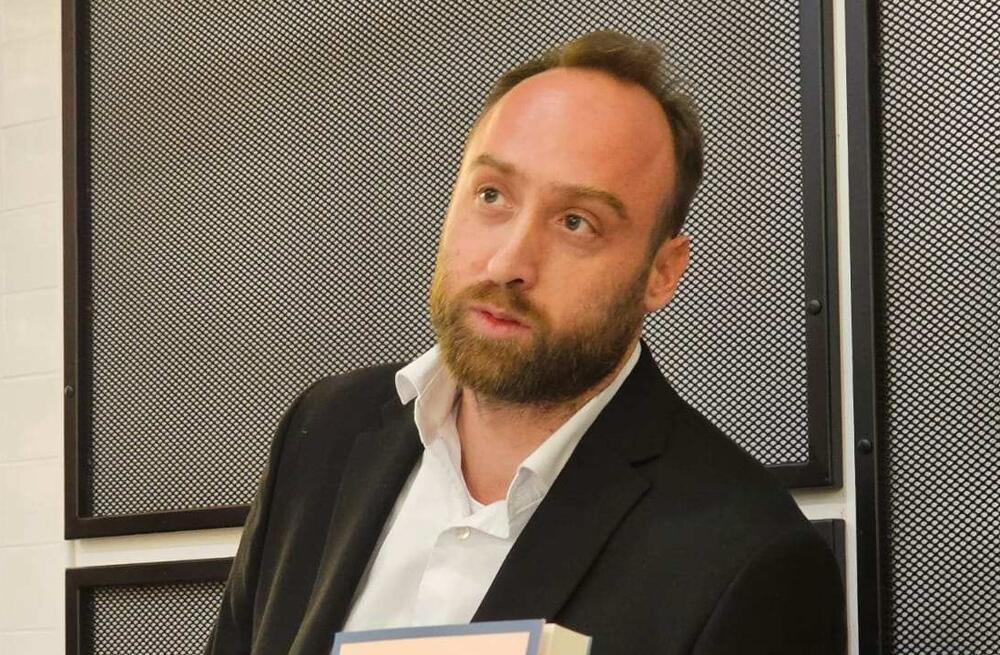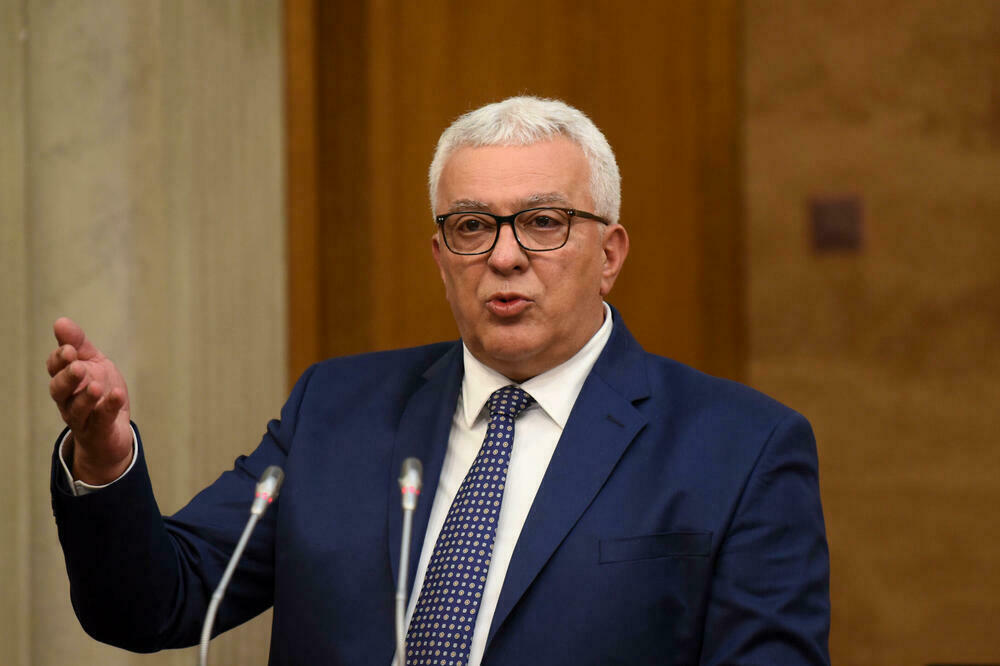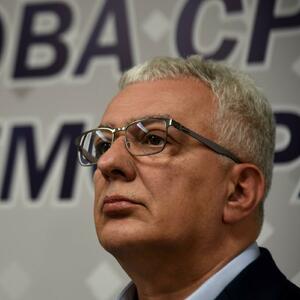Head of the Assembly and the New Serbian Democracy (NSD) Andrija Mandic he has been a party leader for over 21 years, which makes him the longest-serving active president of a party in Montenegro.
He was the leader of the Serbian People's Party (SNS) for six years, from 2003 to 2009, while NSD has been leading for the last 15 years. Today, he received a new four-year term at the head of that party, as he was the only candidate for its first man.
Only two former leaders led parties longer than Mandić - Mehmet Bardhi who was at the head of the Democratic Alliance in Montenegro for over 28 years, i Milo Djukanovic who was the president of the Democratic Party of Socialists (DPS) for less than 25 years.
If Mandić is re-elected today at the NSD Assembly and if he remains at the head of the party until the end of the new mandate, the days will decide who will be in second place on the list of longest-serving leaders - him or Đukanović.
The NSD was created by the unification of the SNS and the People's Socialist Party. During the FRY, Mandić was the deputy federal minister of economy Milan Bek. In Mandić's official biography, there is no information about when he started his political career. His first political involvement was in the People's Party (NS), and his former associates claim that he entered politics through the Union of Reform Forces of Yugoslavia. Anto Marković in the early nineties.
With the group led Božidar Bojović, Mandić left NS in 1997, after part of the leadership of that party approached Đukanović, and founded SNS. The newly formed party split in 2003 after the conflict between Mandić's and Bojović's factions. Mandić then becomes the head of SNS, while Bojović forms the Democratic Serbian Party.
Medojević has been in charge since 2006, Knežević and Bečić are heading for double-digit seniority
When it comes to other active leaders, after Mandić, his colleague from the former Democratic Front has the longest tenure Nebojsa Medojevic, who has led the Movement for Change (PzP) since its founding in 2006. That party lost its parliamentary status in last year's national elections.
They have been in party positions for more than 10 years Fatmir Đeka, who has been at the head of the Democratic Party since its formation in 2011, and Mehmed Zenka who has been the leader of the Democratic Union of Albanians since 2012.
Milan Knezevic, Aleksa Becic i Miodrag Lekić have been presidents of the Democratic People's Party, Democrats and Demos for nine years. Dritan Abazovic i Vladimir Jokovic they lead the Citizens' Movement URA and the Socialist People's Party (SNP) for seven years, Nick Djelosaj Albanian alternative five and a half, Srđan Pavićević Union of Citizens CIVIS pet, a Ervin Ibrahimovic i Genzi Nimanbeg Bosniak Party (BS) and Force for three years each.
For almost three years, he has also been in the position of the head of the United Goran Danilović, Damir Sehovic has been the leader of the Social Democrats (SD) for two years, doc Milojko Spajic he has been leading the Europe Movement for a year and a half now.
Krivokapić led the party for 18 years, Cunga for 16, Huhović for 15...
As for former leaders, apart from Bardhi and Đukanović, the former head of the Assembly also spent a long time at the head of the party Ranko Krivokapic, who led the Social Democratic Party (SDP) for 18 years - from 2001 to 2019. And that party, like PZP, lost its parliamentary status last year.
Former mayor of Ulcinj Nickname Cungu he was the president of Force for 16 years, while he is the former vice president of the Government Rafet Husovic spent 15 years at the head of BS.
Marija Vučinović, minister without portfolio in the Government Duško Marković, was the president of the Croatian Civic Initiative for 14 years, and he led the Liberal Party for the same number of years Andrija Popović.
Former president of the SNP Srdjan Milic was in the leading party position for less than 11 years.
The fact that the same people lead the parties for years, even decades, testifies primarily to the fact that personnel changes in parties are difficult. At congresses and assemblies, more than one candidate for the leadership rarely appears, and when this happens - it represents an announcement of internal party crises and splits. There are more examples. Bečić's Democrats were created after a conflict within the SNP. Bečić was a candidate for the president of that party, and after Milić was elected instead of him at the congress in 2014, he left the SNP with his supporters.
SD was created by the separation of the SDP faction gathered around Ivan Brajović, who was defeated by Krivokapić at the 2015 congress.
The current head of the SNP Vladimir Jokovic he came to that position in 2017 by defeating the faction Snežana Ionica, which later split off and founded the Socialists of Montenegro.
Whoever gets hold of the armchair, does not get off it
Civic activist Stefan Djukic assesses for "Vijesti" that the parties in Montenegro are big companies. He explains this by saying that, according to the Constitution and laws, all power is in their hands except, as he says, a few mostly cosmetic instruments that give certain opportunities to citizens.
"Having that in mind, this concentration of power, this opportunity to staff in all possible places, if you are the president you have more power in your hands than if you were the director of a multinational company. That's why whoever 'obtains' the presidential office does not want to step down, because he gives the last word on the electoral list, municipal committees, but also has a decisive influence on the composition of the board of directors, etc., says Đukić.

He says that most of the party elections in Montenegro were tied to only one candidate, and that the opposing candidates appeared as people who would take over the "staffing and management apparatus".
"Those fights were clan-based, which group of people in the party will further influence employment. The differences were not ideological, nor were the party fights fought for the reason of changing policy, changing principles, or reshaping the party. It's just a matter of whose people will be on top," explains the interlocutor.
Đukić points out that this practice first of all speaks of an "unhealthy and excessively powerful party system".
"People don't go there to fight for principles, for running politics, for ideological things. The predominant reasons are employment and people's indebtedness by employing others. I don't remember when we heard that someone wants to realize a certain political interest and that they will run for the party, and then conduct politics that way - we just have non-specific platitudes about 'fighting crime' and the like. Thus, in our political arena, there is not a struggle of principles, a struggle of policies, but a struggle among the staff," he says.
Joković and Đeljošaj limited their mandates
The parties of Vladimir Joković and Niko Đeljošaj adopted, through changes in the statute, decisions that no one can hold the office of party leader for more than two mandates. The SNP did it in 2021, and the Albanian Alternative last year. Therefore, the current mandate will be the last for both leaders.
In the fall, Joković told "Vijesta" that he will be happy when there is a change in the leadership of the party.
"We are the only party that changed four presidents, and in Montenegro there are parties that have the first and the last president. We already have four, and very soon we will have a fifth," he announced.
Đeljošaj, after the party's decision, said that they made that move "promoting exemplary democratic values", and added that limiting mandates is a rarity, especially in the Balkans.
"Since this is my second mandate, in the next assembly after four years, the Albanian Alternative will get a new president," he said on that occasion.
Bonus video:





